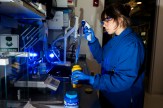Delivering drugs on time and on target
Vladimir Torchilin, distinguished professor of pharmaceutical sciences at Northeastern University, recently received a $1.36 million grant from the National Institutes of Health’s Cancer Institute to examine a new, nanotechnology-based method of drug development.
Coupling pharmaceutical nanotechnology with a new drug-coating process, this novel technique has the potential to make water-insoluble drugs effective and increase the amount of active drug ingredients in the medication.
“The technique we propose could improve the function of existing drugs and could also produce new therapeutic options for many diseases,” said Torchilin, who is the director of Northeastern’s Center for Pharmaceutical Biotechnology and Nanomedicine, and the principal investigator on the grant.
Water-insoluble drugs have a low efficacy rate because they are poorly absorbed in the body, and can cause blood vessel blockages if injected. These properties have hindered the development of water-insoluble drugs as viable treatment options, leaving thousands of promising therapeutics on the shelf.
To counter these properties, Torchilin together with his collaborators from Louisiana Tech University has applied a layer-by-layer method of coating drug nanoparticles with certain biocompatible polymeric materials. These materials prevent drug precipitation or aggregation into larger particles, enabling the drugs to be injected into the body and travel precisely to the disease target. Additionally, more of the drug’s active ingredients reach the target, and can be programmed to release at a specific time.
Torchilin’s research on nanocarriers has played a major role in the field of nanomedicine, which is expected to be a $15 trillion industry by 2015. Torchilin likens nanocarriers to trains, delivering precise amounts of drugs to a specific place at a specific time. While en route to their destination — diseased cells — nanocarriers envelop the drugs like a train’s boxcars, preventing them from killing healthy cells.
“Cancer drugs need to be delivered inside the cell in order to kill cancer cells, and nanocarriers make that possible,” said Torchilin. “There are many potential applications for insoluble drugs, and this new technology will help us explore these options.”
The research, now being conducted in vitro (with target cells in a controlled environment), will eventually be tested in mice to investigate its’ potential application in humans.
Torchilin is working with Yuri Lvov, professor of micro and nanosystemsat Louisiana Tech University.
For more information about Professor Torchilin’s research, please visit http://www.northeastern.edu/bouve/faculty/torchilin_v.html.





